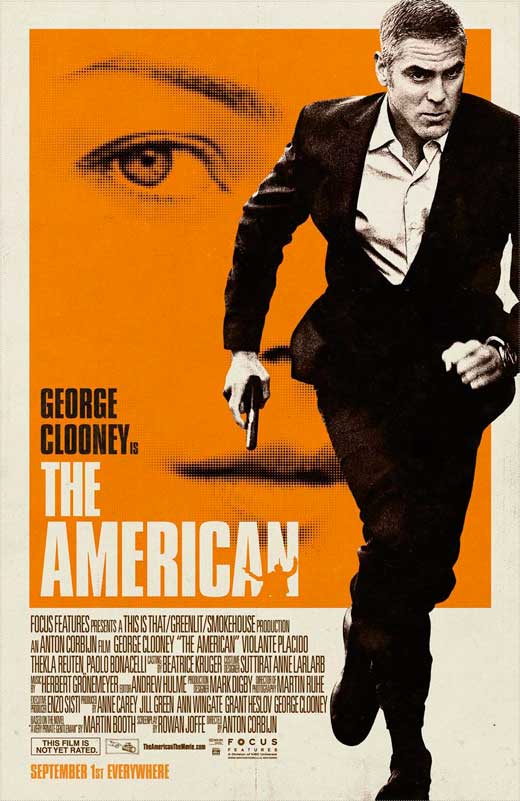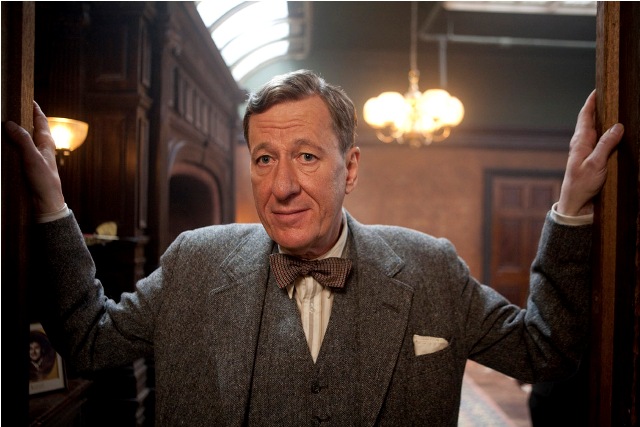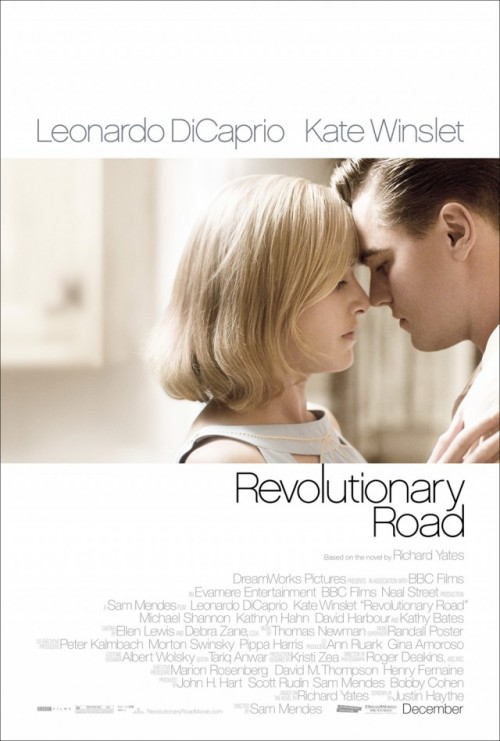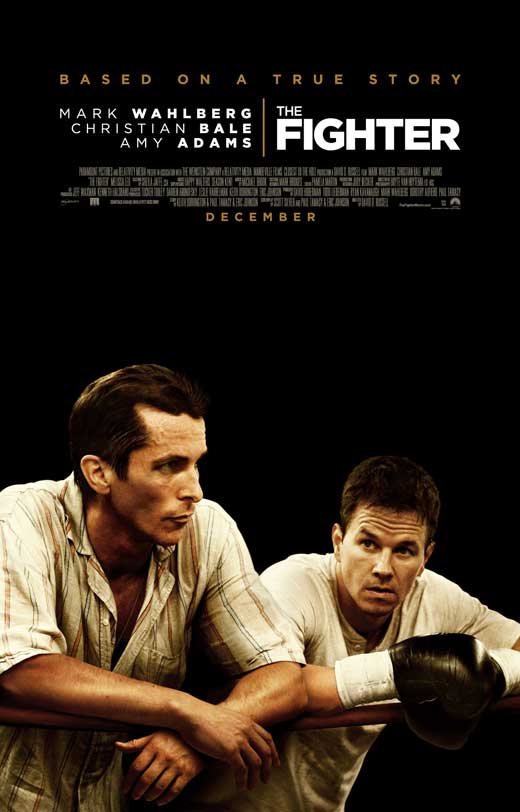

Directors: Ethan & Joel Coen, 2010. (PG-13)
For their first Western, the Coen brothers chose to remake or reimagine
True Grit, the film that earned Marion Morrison, better known as John Wayne, his only Oscar. And they crafted a terrific film that is perhaps even better than the "original" (though both are based on the book by Charles Portis).
True Grit offers tremendous gratification: it's a barrel of fun!
They chose to saturate the film in biblical themes of law, justice, retribution and redemption and church music. Indeed, the opening title card declares, "The wicked flee though no one pursues," a quote from the first half of Proverbs 28:1. And this sets the tone for the movie, basically summarizing the story in one line.
The movie begins with a calm scene, snow gently falling. But as the camera pulls away, we see a body lying outside a house. A man is dead, a killer flees on horseback and no one cares. No one chases him. The dead man is Mattie Ross' father, shot by hired hand Tom Cheney (Josh Brolin). Leaving her mother back home on the farm, 14-year-old Mattie (Hailee Steinfeld) travels by train to the town where the murder occurred to take care of the body and seek vengeance.
For a 14-year-old she packs a verbal wallop and is not afraid to stand up to the toughest of characters. Wielding the law, and citing her attorney, she shoots high and gets what she aims at. Asking for a US marshal she can hire to track Cheney into the Indian Nations where he is hiding, she is told of the best two: Rooster Cogburn (Jeff Bridges, the "Dude" in the Coens'
The Big Lebowski) and Texas Ranger LaBoeuf (Matt Damon,
Invictus). But Cogburn is the one with "true grit", a determination to get his man dead or alive, usually dead. And he is the one she hires . . . on the condition that she accompanies him. However, when Cogburn teams up with LaBoeuf, they form an unlikely trio on an unwavering journey.

As with most of their films, the Coens mix humor into the drama and there are laughs aplenty, although much of the humor here is dark, as violence and death form the backdrop. Moreover, the script is delightful, with dialog that is razor sharp spoken in a weird redneck twang that is impossible to place. (As an example, LaBoeuf tells Mattie, after watching her sleep in her room, "You give out very little sugar with your pronouncements. While I sat there watchin' I gave some thought to stealin' a kiss. . . . though you are very youg, and sick, and unattractive to boot. But now I have a mind to give you five or six good licks with my belt." She replies, "One would be just as unpleasant as the other.")
The Coens work here with a terrific cast. Bridges is in fine form as the irrascible, drunken reprobate Rooster Cogburn, delivering his lines in a slur that is almost beyond understanding. He is clearly enjoying this role. Damon shows he can offer comic lines with the best of them. But it is Hailee Steinfield in her debut feature film that stands out. She not only holds her own with these veterans but centers the film.
The three main characters offer different perspectives on the themes of law and justice. We first see Cogburn in a court of law, on the witness stand defending his right to have shot three men. We discover his background as a lawyer, but his departure from that career as too confining. For him, as for Mattie, the law restricts and puts too many boundaries. These two want to take the law into their own hands. They consider themselves above the law. LaBoeuf, on the other hand, works within the law, quietly diligent and methodical in his approach. He gets his man, but it takes time, and he brings them to justice where they can be tried before they are hanged. Rooster cannot spare such time. He metes out his own form of justice. For him, there is no need for the noose; rather, a quick bullet in the heart will suffice. And it is cheaper, too.

How do we approach the law? Too often we feel we are better than others, then second guess the laws of the land. We may find ourselves more like Mattie and Rooster, thinking the laws don't apply to us, or are too impatient to be particular.Though we are no longer under the biblical law (Rom. 6;14), having been freed from that by Christ himelf (Acts 13:39), we are yet expected to honor God's law (1 Cor. 9:21) and respect the authorities in government over us (Rom. 13:1), and that includes obeying the law. We cannot simply use and abuse the law.
Mattie introduces the second theme of the film, vengeance, in an opening line spoken over her exit from the train: "You must pay for everything in this world, one way or another. There is nothing free except the grace of God." Here is the American concept of "no free lunch". We will come back to the idea of grace later.

Mattie wants vengeance not justice. For her, retribution is required even demanded. Someone must pay for her father's death. She wants Chaney dead, preferably at her hands not at the end of a rope. She concurs with Cogburn. LaBoeuf, however, wants Chaney brought back to Texas, where he killed a US senator. There he can stand trial and find justice for his crimes, not to mention the Texas Ranger will benefit from a bigger reward. But Mattie does not want justice. She does not want him tried for some other killing. She wants his head for her father's murder. That is vengeance.
Vengeance is very personal. It is the inflicting of harm on a person by another who has been harmed by that person. It is violent revenge. But it works outside the law, making the avenger an outlaw. God addressed this directly through the apostle Paul: "Do not take revenge, my dear friends, but leave room for God’s wrath, for it is written: 'It is mine to avenge; I will repay' " (Rom. 12:19). God sees all that occurs and is the judge of mankind (Psa. 75:7). He will not let any crime go unpunished, but he often chooses to delay this judgment, sometimes deferring it to the final judgment (Rev. 20:11). We may not like his timing, and in our impatience find ourselves like Mattie wishing to take matters into our own hands. But the message is clear. It is not our place to do this. We put ourselves on God's throne when we do this. It is both better and biblical to leave it in his very capable hands.
One of the delights of
True Grit is the score by Carter Burwell, the Coens' usual orchestrator. Together, they decided to use hymns from the western period as the music. The main motif comes from Elisha Hoffman's 1887 classic, "Leaning on the Everlasting Arms." Virtually every scene uses this melody in one variant or another. From piano to violin to oboe, this melancholic music wafts over the wide snow-covered meadows of the wild west here.
The music also reflects the religious convictions of Mattie, and her journey toward revenge. "Oh how sweet to walk in this pilgrim way" -- these words from the second stanza point to her pilgrimage of vengeance. "What have I to dread, what have I to fear, leaning on the everlasting arms?" points to her security, first with Rooster and LaBoeuf, but ultimately with Jesus. Toward the end, with victory assured, Burwell brings the notes of "What a Friend we have in Jesus." Indeed, we can lean on the arms of Jesus and find a friend who will never let us down. Mattie found that and we realize it through this score.

The final theme is redemption. As the journey unfolds and the villain is found, all three characters find their own true grit tested. In so doing, Rooster in particular discovers his own depravity and performs an act of selflessness that enables him to find redemption of sorts.
Redemption, the act of rescue or deliverance, is something all three needed in one way or another in this film. And it is something we all need even now, one hundred years later. We may find ourselves vengeful like Mattie, self-righteous like LaBoeuf, or debouched and drunk like Rooster, but we all have gone astray from God's design for us (Isa. 53:6). Yet, in his grace, he has reached down into our world, to find us in our own particular sins, and he offers us rescue (1 Thess. 1:10). He is our redemption (1 Cor. 1:30). He has paid for our deliverance through his blood (Eph. 1:7). We must choose to accept this or reject it, but it is a biblical fact. How you approach law and justice and vengeance will ultimately pale in comparison to how you approach God's redemption. Grace is truly free. Jesus is the real hero with true grit.
Copyright ©2011, Martin Baggs
 Well, the Oscars came and we had a party to remember with the Jenkins, our co-leaders for the Mosaic Movie Connect Group. After a mountain of Thai food during the red carpet show, the ceremony began in earnest with Anne Hathaway in the first of her 500 or so outfit changes and James Franco looking like he was on valium.
Well, the Oscars came and we had a party to remember with the Jenkins, our co-leaders for the Mosaic Movie Connect Group. After a mountain of Thai food during the red carpet show, the ceremony began in earnest with Anne Hathaway in the first of her 500 or so outfit changes and James Franco looking like he was on valium. 














 As with most of their films, the Coens mix humor into the drama and there are laughs aplenty, although much of the humor here is dark, as violence and death form the backdrop. Moreover, the script is delightful, with dialog that is razor sharp spoken in a weird redneck twang that is impossible to place. (As an example, LaBoeuf tells Mattie, after watching her sleep in her room, "You give out very little sugar with your pronouncements. While I sat there watchin' I gave some thought to stealin' a kiss. . . . though you are very youg, and sick, and unattractive to boot. But now I have a mind to give you five or six good licks with my belt." She replies, "One would be just as unpleasant as the other.")
As with most of their films, the Coens mix humor into the drama and there are laughs aplenty, although much of the humor here is dark, as violence and death form the backdrop. Moreover, the script is delightful, with dialog that is razor sharp spoken in a weird redneck twang that is impossible to place. (As an example, LaBoeuf tells Mattie, after watching her sleep in her room, "You give out very little sugar with your pronouncements. While I sat there watchin' I gave some thought to stealin' a kiss. . . . though you are very youg, and sick, and unattractive to boot. But now I have a mind to give you five or six good licks with my belt." She replies, "One would be just as unpleasant as the other.") How do we approach the law? Too often we feel we are better than others, then second guess the laws of the land. We may find ourselves more like Mattie and Rooster, thinking the laws don't apply to us, or are too impatient to be particular.Though we are no longer under the biblical law (Rom. 6;14), having been freed from that by Christ himelf (Acts 13:39), we are yet expected to honor God's law (1 Cor. 9:21) and respect the authorities in government over us (Rom. 13:1), and that includes obeying the law. We cannot simply use and abuse the law.
How do we approach the law? Too often we feel we are better than others, then second guess the laws of the land. We may find ourselves more like Mattie and Rooster, thinking the laws don't apply to us, or are too impatient to be particular.Though we are no longer under the biblical law (Rom. 6;14), having been freed from that by Christ himelf (Acts 13:39), we are yet expected to honor God's law (1 Cor. 9:21) and respect the authorities in government over us (Rom. 13:1), and that includes obeying the law. We cannot simply use and abuse the law. Mattie wants vengeance not justice. For her, retribution is required even demanded. Someone must pay for her father's death. She wants Chaney dead, preferably at her hands not at the end of a rope. She concurs with Cogburn. LaBoeuf, however, wants Chaney brought back to Texas, where he killed a US senator. There he can stand trial and find justice for his crimes, not to mention the Texas Ranger will benefit from a bigger reward. But Mattie does not want justice. She does not want him tried for some other killing. She wants his head for her father's murder. That is vengeance.
Mattie wants vengeance not justice. For her, retribution is required even demanded. Someone must pay for her father's death. She wants Chaney dead, preferably at her hands not at the end of a rope. She concurs with Cogburn. LaBoeuf, however, wants Chaney brought back to Texas, where he killed a US senator. There he can stand trial and find justice for his crimes, not to mention the Texas Ranger will benefit from a bigger reward. But Mattie does not want justice. She does not want him tried for some other killing. She wants his head for her father's murder. That is vengeance.
























